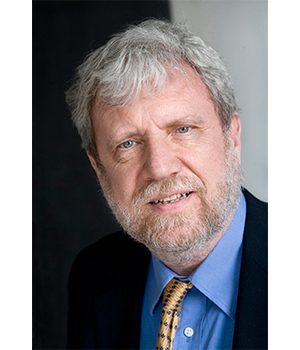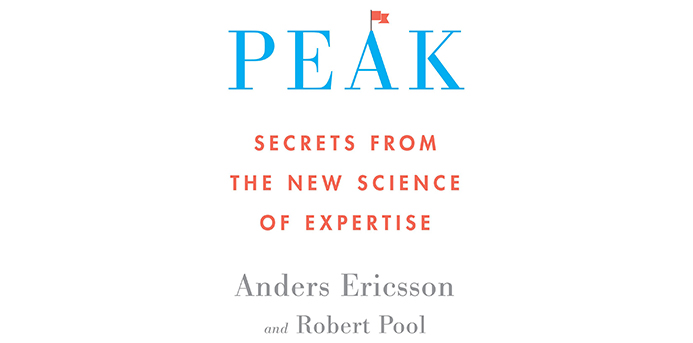In his 2008 book, “Outliers: The Story of Success,” journalist Malcolm Gladwell says, “Researchers have settled on what they believe is the magic number for true expertise: ten thousand hours” and goes on to call it the “10,000-hour rule,” citing a study done by Dr. K. Anders Ericsson in the early 1990s as the basis for this guideline. Gladwell’s 10,000-hour rule oversimplifies the work it takes to achieve expertise, but accurately stresses that higher levels of performance indeed require a great time commitment.

Eight years later, Ericsson himself gets specific and sets the record straight in his new book, “Peak: Secrets from the New Science of Expertise.” The researcher and professor of psychology at Florida State University says his book is about “a fundamentally new way of thinking about human potential, one that suggests we have far more power than we ever realized to take control of our own lives.” Whether the goal is to rise to elite performance levels or just steadily improve, Ericsson makes sure the hours committed — be it 10 or 10,000 — aren’t spent in vain, providing context for structuring practice while downplaying the role of natural or innate talent.
The “Gift” We All Possess
When Mozart was just seven years old, he began a performance tour of Europe. In addition to his talent for playing the violin and various keyboard instruments, he also possessed the ability to correctly identify any note played on any musical instrument. Ericsson points out that because only one in every 10,000 people have this type of “absolute” or “perfect” pitch, its relative rarity makes it seem like something you’re born with.
More recent research has revealed that everyone who has this “gift” received some sort of musical training at a very young age (3 to 5 years old) and that those who spoke tonal languages (like Mandarin or Vietnamese) were more likely to have it. A 2014 study conducted in Japan trained 24 children for 12 to 18 months. “After completing training every one of the children in the study had developed perfect pitch,” Ericsson says. It turns out perfect pitch is achieved through a combination of the right exposure and training — rather than inborn talent.
Genetic endowment only seems to make a difference in areas where specific physicalities are linked to success, for example, the way height contributes to basketball performance. Ericsson notes that when we encounter someone with extraordinary skill, we tend to say things like, “She is so gifted,” or “He has a natural gift.” But, he says, “Over my years of studying experts in various fields, I have found that they all develop their abilities in much the same way … through dedicated training that drives changes in the brain.” He adds, “The main gift that these people have is the same one we all have — the adaptability of the human brain and body, which they have taken advantage of more than the rest of us.”
Purposeful Practice
Purposeful practice is the act of identifying a goal, engaging in training activities, adjusting the difficulty level, gaining feedback then reflecting upon performance. Unlike “naive practice,” which Ericsson describes as “essentially just doing something repeatedly, and expecting that the repetition alone will improve one’s performance,” purposeful practice is entered into with great forethought and focus. Naive practice is what many of us engage in when we play golf or tennis and is how our kids often practice piano; we incorrectly assume all it takes is hours accumulated to help us improve.
In his book, Ericsson says purposeful practice is characterized by the following:
- Well-defined, specific goals (i.e., play a piano piece all the way through at the proper speed without mistakes three times in a row).
- Focus: Give the task your full attention.
- Feedback: You need feedback — either from yourself or from outside observers — to identify where and how you are falling short.
- Getting out of your comfort zone: This is perhaps the most important part of purposeful practice; you must push yourself beyond what is familiar and comfortable. Generally the solution is not “try harder” but “try differently” by finding ways around barriers.
When we begin purposeful practice, Ericsson says, “Performance is correlated with things like IQ and memory abilities, but as practice continues, we create new structures to support improvement.” Changes are seen in both physical and mental structures. For example, runners experience growth in capillaries and changes in their muscle fibers and mathematicians show more gray matter in the part of the brain involved in calculations — the inferior parietal lobule.
Ericsson calls “purposeful practice” a step toward “deliberate practice,” which is our ultimate goal.
Deliberate Practice
Deliberate practice “first … requires a field in which the best performers have attained a level of performance that sets them apart from those just entering,” Ericsson says. Activities like music, dance, chess and many sports fit the profile. “Second,” he continues, “it requires a teacher who can provide practice activities designed to help improve performance … In particular, deliberate practice is informed and guided by the best performers’ accomplishments and by an understanding of what these expert performers do to excel.”
Deliberate practice incorporates all the hallmarks of purposeful practice — specific goals, focus, feedback and pushing past one’s comfort zone — but it also involves a teacher or coach and often breaks down particular aspects of skills for development towards the overall performance goal.
In his book, Ericsson shares as an example of a corporate coach who’s embraced the concept of deliberate practice and helps clients apply these principles in the work world. The coach first tells clients to abandon the business-as-usual mindset and banish “I can’t” and “I’m not good at” statements. Ericsson says the coach also stresses that “doing the same thing over and over again in exactly the same way is not a recipe for improvement; it is a recipe for stagnation and gradual decline.” Instead, clients (and anyone implementing deliberate practice) must acknowledge the potential they possess, adopt a new mindset about growth and expand their comfort zone. The last step is to revise how they practice by using techniques specifically designed to improve particular skills (like selling, teamwork or managing others). Those seeking improvement in various areas of life will find that the same steps can be effectively applied to many situations.
Anders Ericsson spoke at a Family Action Network (FAN) in Northfield in April. The event was not filmed; don’t miss out on any more speakers — visit FAN’s site for a list of upcoming events and to sign up to receive their e-newsletter.
FAN Annual Sponsors: Martin & Mary L. Boyer Foundation, Compass Health Center, Erikson Institute, Evanston Township High School, Make It Better, Mammal Foundation, New Trier Township High School, Pathways, Tina & Byron Trott
FAN Strategic Partners: Acclaim Media, Center for Talent Development at Northwestern University, Curt’s Cafe, Evanston/Skokie School District 65, Hackstudio, Loyola University Chicago School of Law, Master of Science in Education Program at Northwestern University, North Shore Community Bank & Trust, Northern Suburban Special Education District, New Trier Parent Association, Northwestern University, Redefined Fitness, The Book Stall, The Family Institute at Northwestern University, Y.O.U., YWCA Evanston/North Shore
FAN In-Kind Sponsors: Kirkland & Ellis, Turing Group
More from Make It Better:

